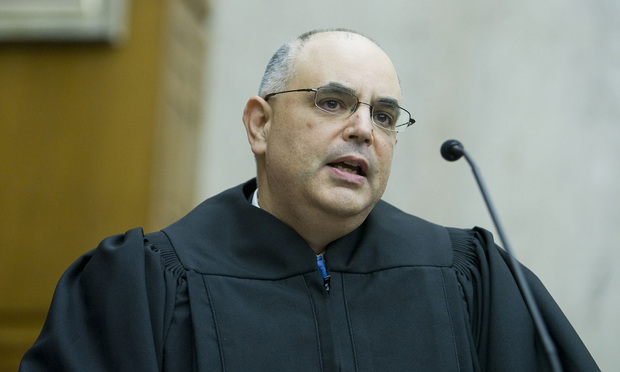Government Gets Critical Ruling in Iran Sanctions Criminal Case

Judge Rudolph Contreras, of the U.S. District Court for the District of Columbia, during his official Investiture ceremony. June 20, 2012. Photo by Diego M. Radzinschi/THE NATIONAL LAW JOURNAL.
When the United States Government wants to criminally prosecute someone for a violation of the Iran primary trade embargo–the Iranian Transactions and Sanctions Regulations (ITSR)–they have a major hurdle to overcome: willfulness. Willfulness is what differentiates a criminal sanctions case from a civil enforcement sanctions case. In the Iran sanctions context this has been defined by some courts to occur when there is a violation of a known legal duty. Obviously, how prosecutors establish that a defendant violated a known legal duty in the Iran sanctions context will vary on a case-by-case basis. However, in at least one pending case–U.S. v. Hassanshahi–the Government has a path towards establishing willfulness thanks to a recent ruling by the Honorable Rudolph Contreras of the U.S. District Court for the District of Columbia.
In order to establish that Mr. Hassanshahi willfully violated the ITSR, the government seeks to enter in an opinion from the California Court of Appeals from a case that Mr. Hassanshahi was allegedly a party to. In order to do so, the Government provided notice under Federal Rule of Evidence (FRE) 404(b) that it would offer the opinion as evidence for the purpose of showing that Mr. Hassanshahi knew he would need a license from the United States Department of the Treasury’s Office of Foreign Assets Control (OFAC) to do business with Iran. FRE 404(b) is an evidentiary rule that states that evidence of prior bad acts cannot be submitted to show a defendant’s bad character. However, such evidence can be admissible for other purposes–e.g., to demonstrate motive, opportunity, intent, knowledge, absence of mistake, etc. Here, the Government wants to enter into evidence the California Court of Appeals opinion to show that Mr. Hassanshahi was previously advised that doing business with Iran requires an OFAC license.
The opinion at issue here was from Kashani v. Tsann Kuen China Enter. Co., Ltd. (“Tsann”). In that case, the Government alleges that Mr. Hassanshahi and others sought to enforce a contract they entered into with Tsaan that allowed them the exclusive right to manufacture and sell Tsann’s computers in Iran. Tsann countered that the contract was unenforceable as contrary to public policy because it violated the ITSR. The California Court of Appeals explained that there exist “only two ways to avoid the prohibitions on dealing with Iran: coverage under a general license authorizing certain categories of transactions and issuance of a specific license” and also noted that the plaintiffs were United States citizens residing in California and that the “express purposes of the agreement were to supply goods, technology, and services to Iran and even to sell products to the Government of Iran.” Finally, the California Court of Appeals stated that the plaintiffs “d[id] not contend that they had obtained authorization for their activities pursuant to any specific license.”
The Government asserts that the Kashani opinion demonstrates that Mr. Hassanshahi was previously informed that his attempt to do business in Iran without an OFAC license violated the law, and therefore shows his “knowledge, intent, motive, and lack of mistake or accident” in regards to the conduct alleged in the current criminal case. Specifically, the Government has stated that it will offer the evidence to demonstrate that Mr. Hassanshahi and his company “had actual knowledge of the OFAC licensing requirement, but they knowingly and intentionally ignored the laws,” and that their export activities to Iran was “no mistake or accident.” The Government is proposing to exclude most of substantive discussion of the opinion or the prior act, and only seeks to focus on the prior lawsuit and the outcome.
Judge Contreras found the opinion to be “highly probative” and that it shows that Mr. Hassanshahi was informed that efforts to export goods or services to Iran without an OFAC license are in violation of the ITSR. Thus, the Court held that such evidence speaks to an absence of mistake. The Court did, however, offer some hope to Mr. Hassanshahi by stating that although the opinion is admissible under FRE 404(b), that it will defer final consideration of the excerpts of the opinion and any other, specific piece of evidence—including the necessary weighing under Rule 403—until the Government seeks to admit it at trial. This is a common way to deal with such issues, and I’ve seen judges take the same approach in a number of the Iran sanctions criminal cases we’ve tried or otherwise been a part of.
It’s not terribly surprising that Judge Contreras found the opinion to be admissible, nor is it terribly surprising that the Government seeks to introduce the opinion. What is perhaps most surprising here is that the government has this level of evidence to support its claim of willfulness. In the IEEPA criminal cases I have tried, there has been far less evidence of willfulness than a court opinion explicitly informing the defendant that they cannot engage in business with Iran without an OFAC license. Thus, while nothing is impossible, Hassanshahi is facing an uphill battle to provide a theory to counter willfulness given the opinion the government will be introducing. How that opinion is used and how the jury reacts to that evidence remains to be seen.
The author of this blog is Erich Ferrari, an attorney specializing in OFAC matters. If you have any questions please contact him at 202-280-6370 or ferrari@ferrariassociatespc.com


